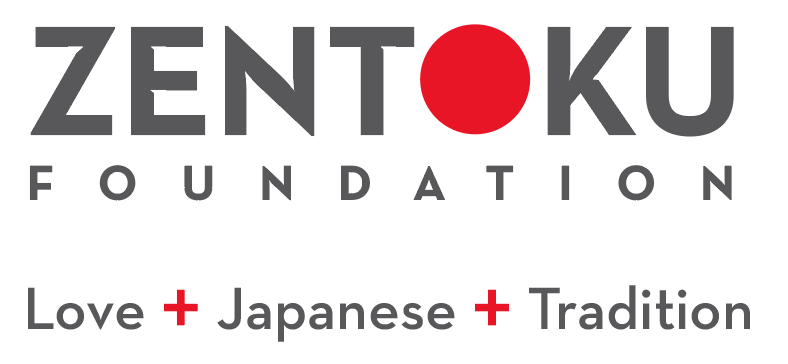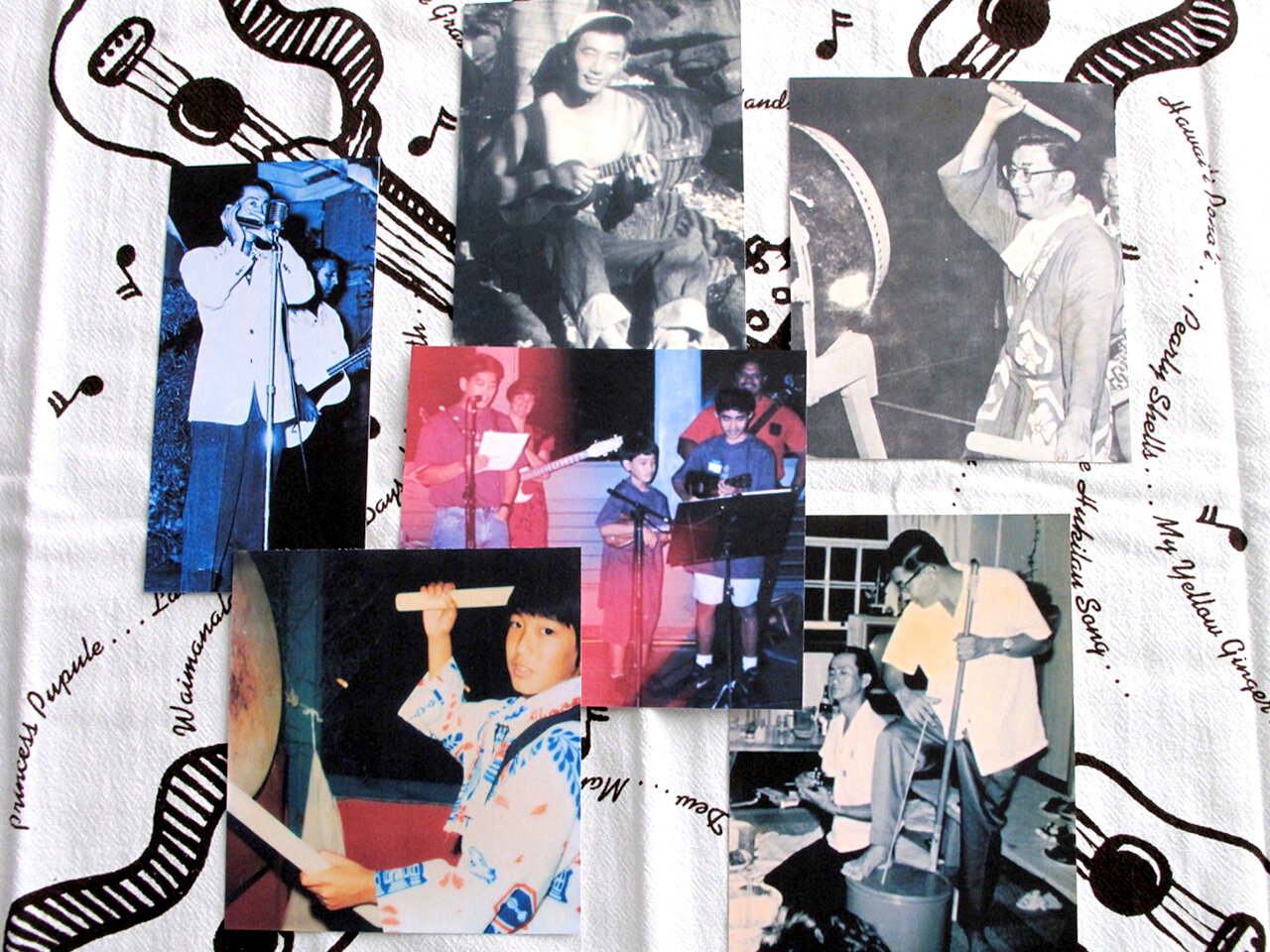The Downtown General Store’s Nostalgic and Fun Flour-Sack Towels
By Jodie Chiemi Ching
Hawaii family draws on Japanese roots and island plantation life to create flour sack towels.
Laurie, mom and Penny dressed in muumuu for May Day. -Lei Towel
Take one ‘ohana (family) and add one part Old Hawai‘i plantation life, one part artistry and lots of aloha, and what do you get?
The traditional flour-sack towel.
This is the story of Penny Sato Kiyabu, a Japanese American who developed into a natural artist, drawing on roots in Fukushima and Tokuyama and her father’s life as a plantation worker. Her father, Rodney Koichi Sato, was born and raised in Pāhala on the island of Hawai‘i; her mother, Tomoe Yoshida, was born in Hawai‘i but lived in Japan with her grandparents from her toddler to teen years.
Her father’s plantation life helped shape her towel-making venture but the biggest influence was her father’s cousin, Tadashi Sato, who studied art in New York and is a well-known artist from Maui. He was an exquisite painter and many of his art pieces were hung around the home of Penny’s parents, reminding everyone of the family talent.
Traditional mochi pounding with Grandpa Yoshida in the Sato backyard. -Honohono Towel
When Penny was growing up, she remembers walking to buy tofu from the neighborhood tofu maker and smelling the wonderful scent of wild honohono (orchid) along the way. The Sato plantation home had two plumeria trees, one yellow and the other pink, which made great lei for May Day. And there was always music. Her father could play the ‘ukulele, harmonica, clarinet, trumpet and flute; he sang all the local Hawaiian songs and even performed for the local obon festival every year. Her mother would dress Penny and her sister, Laurie, in kimono and obi and taught them to dance. Penny never forgot all the Japanese food that her mom cooked: rolled maki sushi and somen to eat on New Year’s Eve. They even pounded mochi with wooden mallets in an old cement usu and cooking the mochi rice in wooden containers over fire. All of these influences later found their way into the towel designs.
She also had a brother, Dan, who graduated with a degree in graphic design, and screen-printed with Penny when she first started her company. Dan realized how talented his sister was when he saw drawings that she had done in her college art classes. Penny graduated from University of Hawaiʻi at Mānoa with a bachelor of fine arts degree in drawing and painting.
Penny designed for the Hawaii State Judiciary Division of Driver Education
The flour sack towel venture began as a family affair. Key to the endeavor was the man who would become her husband, Les Kiyabu, an Okinawan American with ancestral roots in Yagaji Island. Penny and Les had been working together at the Hawaii State Judiciary Division of Driver Education since the early 1980’s. Les was an administrator and Penny was the department’s illustrator. Her work still hangs in many bars and restaurants in Hawai‘i today, including the “Be Aware” poster that Penny illustrated more than 35 years ago.
In 1980, Les and Penny started Downtown General Store. At first, this was a part-time job just screen-printing greeting cards. “When we first started, we would align the screens by eye. We wasted a lot of cards,” said Penny with a laugh.
Les also had an eye for photography, so the couple began selling photos alongside their greeting cards at local craft fairs and later added screen printed t-shirts. But there were so many crafters selling t-shirts that Penny decided to look at other products. Her first attempt was putting their designs on potholders, but the product did not sell very well. So Penny thought of sprucing them up by adding a bamboo rice paddle and packaging them as ready-to-give gifts. And, voilà! They sold like hotcakes!
But the potholders didn’t seem like a long-term product because it was labor intensive, with her mother helping with sewing tasks. So Penny started to investigate screening towels. She ordered samples and decided on the flour-sack towels.
Family of musicians. -Ukulele Jam Towel
Grandpa Yoshida’s Boy’s Day fish and banner with the Yoshida mon. -Koinobori Towel
Each of the vintage-style kitchen towels is uniformly folded and wrapped by Penny herself with a label that says, “During the plantation days, flour was purchased in 100-pound sacks. Once the sacks were emptied, washed and bleached, they had a variety of different uses such as: kitchen towels, cleaning and polishing cloths, diapers and underclothing. They were even sewn together to make sheets and pillowcases in homes that could not afford regular bedding.” These flour sack towels were much better than the thicker kitchen towels that come from the department stores, which stay damp. In contrast, the flour-sack towel is soft, lint free, absorbs more like a paper towel and dries faster; dishes, glassware and windows will not get linty when wiped.
Penny wearing kimono sent by Japan aunty. -Sakura Towel
As their business grew, more silk-screening was required. Since Penny’s brother, Dan, was already working at a local sign shop where he did a lot of silk-screening, he was able to help them out. This turned out to be a win-win situation as Dan was also able to learn more about running a small business. Even Penny’s younger sister, Laurie, pitched in to help. In the end this became a great team as they all had a strength that would contribute to the business. Penny created illustrations, Les offered photography, Dan contributed his design expertise and Laurie helped the packaging and selling of the products at craft fairs.
The “Flour Sack Towels” are now moving into the next generation. Both of Penny’s sons are now contributing to the business. Sky is a graphic artist and uses computer graphics; Cody is a painter and likes to take a brush to paper. Both help design the various artworks and Cody and Les screen print the towels with water-based ink. Some of their Hawaiian and Japanese themes are “Pepe Honu (baby sea turtles),” Ukulele Jam,” Kintaro” and “Sakura,” which reflect the influence of growing up on a sugar plantation with Japanese traditions.
First craft fair selling photos and cards. Later adding t-shirts by Les and sons Sky and Cody. Now back to just Les & Penny selling flour sack towels. -Hachimaki Tapa Towel
Girl’s Day in the 50s in Pahala. -Hinamatsuri Towel
The Kiyabus say they are grateful to be able to do what they love. When they started off, they just wanted to have fun. Penny’s first retail store customer was owner Maile Meyer of Nā Mea Hawai‘i and each year the Kiyabu family picked up one or two more shops as venues for their products. They also custom print exclusive designs for the Bernice Pauahi Bishop Museum, Hakubundo and Alexander & Baldwin Sugar Museum.
One of the best things to happen was getting the Foodland account, Penny said – though she added it was also a bit scary. The agreement was to sell the flour sack towels in their supermarket locations all over the state and to their smaller “food-pantry” shops in many of Hawai‘i’s hotels.
Now tangible pieces of Kiyabu-family joy and Old Hawai‘i plantation history hang in home kitchens all over the world. With the anxieties brought on by the current coronavirus pandemic, we could all use a reminder that happiness is contagious too.











